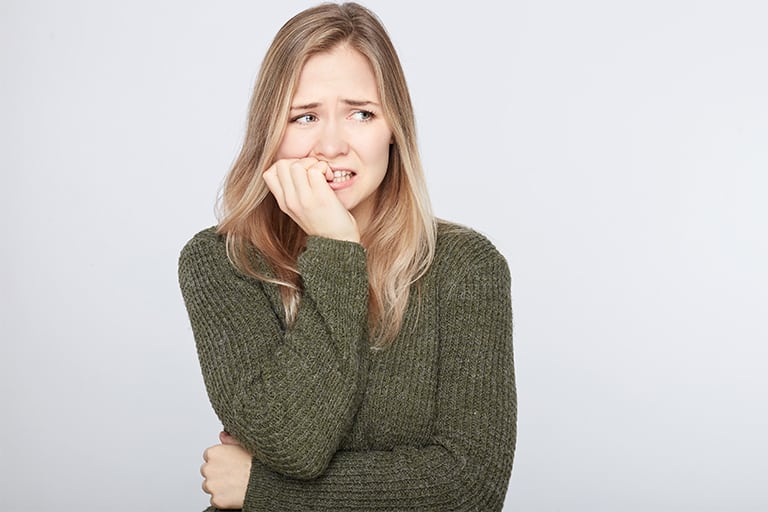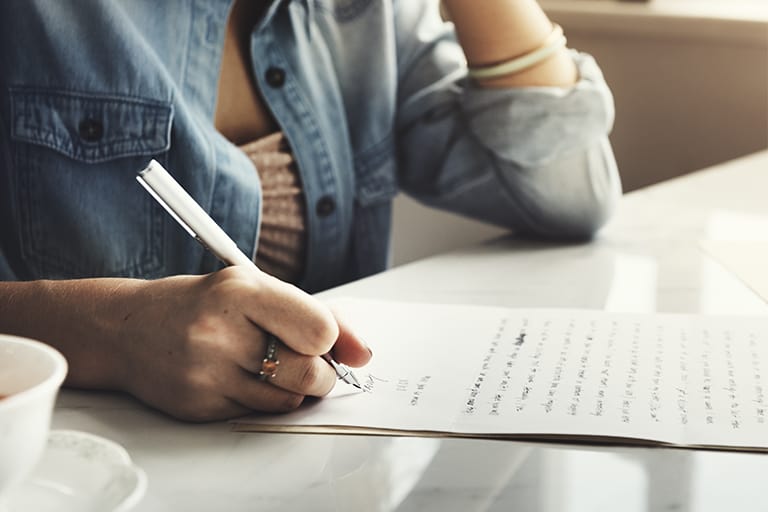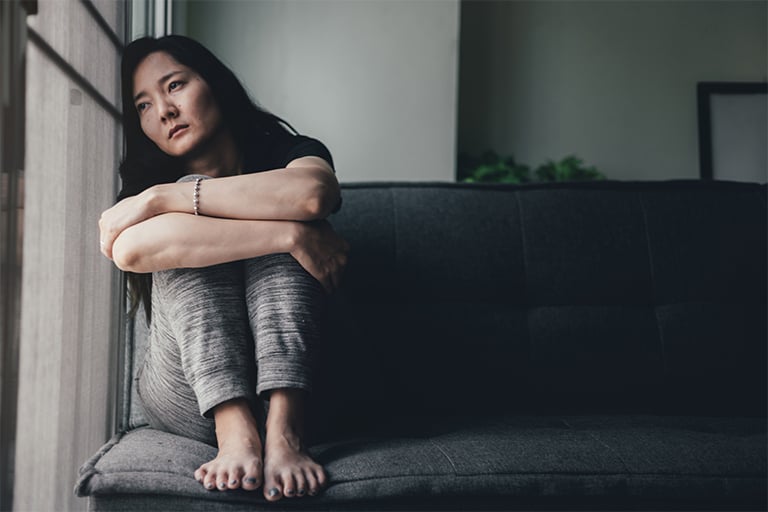Fear is normal when you face danger or an emergency situation. It can also occur when you need to sit an exam, start a new job, socialising and in a myriad of other situations. Have you ever felt this way?
Anxiety is a type of fear triggered by the thought of what may happen in certain situations. And fear is a powerful emotion that can take hold of your mind and body and leave you feeling deflated and defeated. So anxiety is a fear triggered by thinking about something going wrong in the future. It usually has little to do with the present. This usually passes quickly but can last longer when you get stuck in your negative thought patterns.
It can end up taking over and affect your enjoyment of life. Anxiety can affect eating, sleeping, socialising and you may have trouble leaving the house to go to work or school and you may end up fearing to leave the house. These are signs you have severe anxiety.
Anxiety can even prevent you from achieving your goals as it can take over. You may need to learn to cope and learn anxiety management techniques when you cannot break the cycle.
What do you fear?
There are many things that can make you feel fear. Fearing some things such as natural disasters will serve to keep you safe. Being afraid of failure can drive you to succeed but, on the flipside, it can prevent you from trying new things or doing something you really want to do. Know what causes your fear and anxiety is a good first step to breaking the fear cycle.
What causes your anxiety?
Anxiety and fear often go hand in hand, so what we said in the previous paragraph about fear is also true of anxiety. The word anxiety tends to refer to a worry or fear that continually nags at you. In other words, anxiety describes the persist fear of something such as socialising or meeting new people.
How do anxiety and fear feel?
When you feel anxious and fear, your body and mind go into overdrive. When that happens the following can occur:
- Your breathing and heart speed up.
- You can feel dizzy.
- You do not feel hungry, so you go without eating.
- Your mouth dries out.
- You can feel weak or your muscles become tense.
- You experience holt and cold sweats.
- You may not be able to focus on anything other than the negative, nagging voice in your head.
- Your stomach churns making you feel sick.
- You may feel frozen to the spot unable to move.
These are all reactions to fear and your natural ‘flight or fight’ instinct kicks in. Your blood sugar levels increase and blood flows to your muscles so you can only focus on what you fear.

Anxiety disorders
According to the World Health Organization, anxiety disorders are the most common mental health problem people face across the world with 1 in 13 people suffering with anxiety. So you are not alone. Double the number of women as men are diagnosed with anxiety, but 7.2% of young people between the age of 5 and 19 experience anxiety.
If you are often anxious, it is important see your doctor for a diagnosis as you may have an anxiety disorder that needs treating. There are a lot of different types of anxiety disorders, the following are three of the more common ones:
- Social anxiety. Social anxiety is when you intensely fear social situations. You may fear others will laugh at you attack or judge you. You may feel uncomfortable among large groups of people, meeting new people and eating in front of people. All of these can cause an anxiety attack.
- Generalised anxiety disorder. Generalised anxiety disorder is the most common disorder. You may feel worried and anxious all the time without there being an evident cause. You may expect the worst to happen and fight to control how you feel but it may be a losing battle that stops you doing what you want to do. This can cause all sorts of problems such as working, relationships, eating and sleeping.
- Panic disorder. You may have a panic disorder if you have continual, unexpected panic or anxiety attacks. This is scary and can disrupt your life. Panic attacks may make you feel dizzy, shaky and you may even feel like you are going to die because of the high level of anxiety you are experiencing.
Anxiety and its causes
There is no one thing that causes anxiety. It is usually a mix of things such as your personality, life circumstances and upbringing; for example:
- Genetics. There are several studies that demonstrate you may be predisposed to anxiety where someone in your family also has it.
- Traumatic childhood. Experiencing trauma such as bullying and physical and emotional abuse can cause anxiety disorders.
- Life circumstances. The stresses of everyday life may lie behind your anxiety; for example, constant money worries, work and relationship stresses and a worldwide pandemic like COVID-19. But a pandemic will send most people’s anxiety soaring.
- Drugs and alcohol. Certain types of medications, illegal drugs and alcohol can all trigger anxiety in some people.
Anxiety management
When you have the signs of severe anxiety, the news is not all bad. Here are some things you can try to help you manage your anxiety.
Write it out
Write down what makes you anxious. What makes you most afraid? What is the worst that could happen? Write everything down. Once you finish, ask yourself how likely it is the worst case scenario will happen. Is it as bad as you think?
Probably not. Your imagination is blowing it all out of proportion. It is extremely likely the worst case scenarios will never occur. Keep what you have written and look back next time you feel anxious and it will help remove anxiety.

Face your fears
It is normal to avoid situations that cause you to feel fear. This can stop you from doing the things you need or want to do. As long as there is no actual danger, try to push through your fears and face them. When you do, it will not be as bad as you think. The more you do this, the more your fears will reduce.
Mindfulness meditation for anxiety
Try mindfulness meditation for anxiety. This will help you live in the moment and your anxiety will melt away. You will feel calmer and have the clarity you need to focus on problem solving and more positive things instead.
Get moving
Get moving. Exercise every day. It does not have to be hard or for long, but getting moving is great for calming your mind. It will take your mind off your fears to relieve anxiety.
Remember the positive
Think back to other times when you have feared the worst such as when starting a new job, meeting new people or doing something new. What was the result? Probably everything worked out. You may have even had a good time or achieved success. Remembering the positive outcomes is useful for dampening anxious feelings.
Avoid stimulants
When feeling anxious you may turn to caffeinated drinks, alcohol or drugs of some sort and then wonder why your anxiety escalates through the roof. Stimulants will amplify what you fear, so it is a good idea to avoid or at least minimise using them.
Eat well
Ditch the junk food and sugar which sends your blood sugar levels nosediving and can trigger anxiety. Eat a healthy diet of fruits and vegetables and drink water instead of too many caffeinated drinks. Looking after yourself is a great way to reduce the anxiety you feel.

Try alternative methods
Try alternative methods to calm your fears and anxiety. Complementary therapies such as relaxation and breathing techniques, Tai Chi, yoga and meditation can help you relax which will reduce your anxious feelings.
Blissiree Pty Ltd
Managing anxiety and the fears that cause them can turn your life upside down especially if you do not learn how to manage it. And it can affect your mental, emotional and physical health and all areas of your life. It is difficult to manage anxiety when you are so used to feeling anxious about the things you fear. It can become a habit. But if you do not prioritise anxiety management, it will escalate. Until you do something about how you feel, it will continue to negatively impact you and those around you.
The Blissiree Pty Ltd is pioneering a new technique, a natural treatment for anxiety that may help. It only requires you to relax. Highly trained facilitators help you learn how to recognise your fears and how to manage them. It may help you take back control of your life. And you may notice an improvement after the first session.
With some simple changes to your life, and with practice, you can learn to cope better. Discover what triggers your anxiety and work on managing your triggers.
If your anxiety has become a problem that affects your life, it is time to turn it around. Time to do something positive about it. Seek help. Take back control. You do not have to go through it alone. The sooner you get help, the sooner you can start taking good care of your mental health. And get back to enjoying life.
Reach out
If you struggle with controlling your anxiety, reach out to our professionals. When you are not coping, contact us. We can talk to you about getting your life back on track. But if you reach a crisis point, call us immediately. We are here to support you.
We can work with you over the phone, via Skype or in our Spas. Book in today for my Emotional Empowerment Program. I have an introductory offer for just $99 so you may start taking back control of your life. We aim to help you cope with any mental health challenges and aim to help you chase away the fears that trigger anxiety. Our facilitators may alleviate the effects of these so you start to take control and enjoy life again.
Let me help alleviate the effects of anxiety and fear
My Emotional Empowerment Program has helped many people for more than a decade. My aim is to help manage your symptoms. This can give you a new hope for the future. A future filled with happiness, peace and contentment in weeks not years. Listen to what xxxxx has to say about my program after only a few sessions.
Take charge of your life. Book a free 25-minute telehealth consultation. Or discover a seamless way that may help you manage your emotional and mental health by becoming a member. It will give you access to more than 75 audio programs that may help you to live an inspired life.

